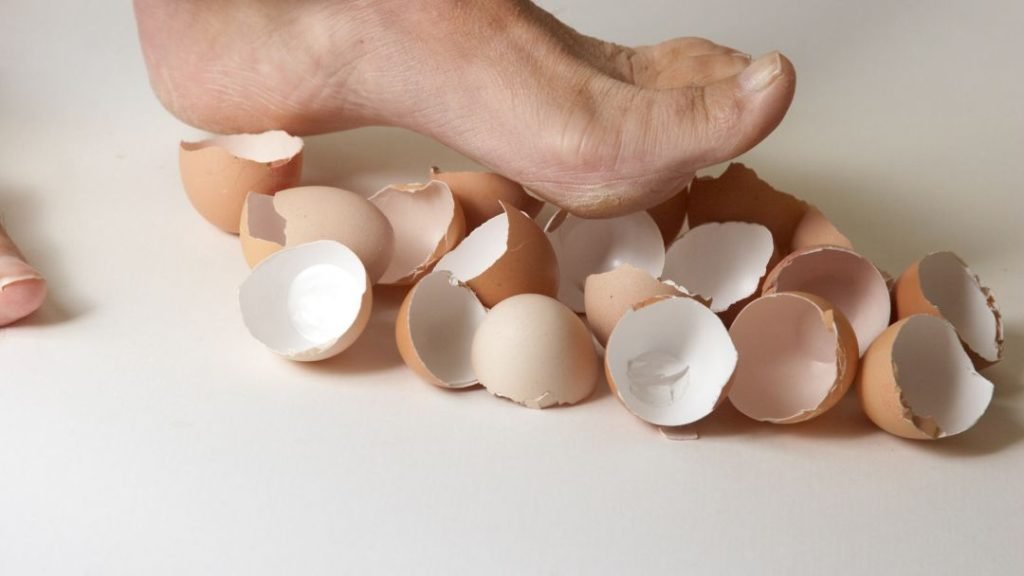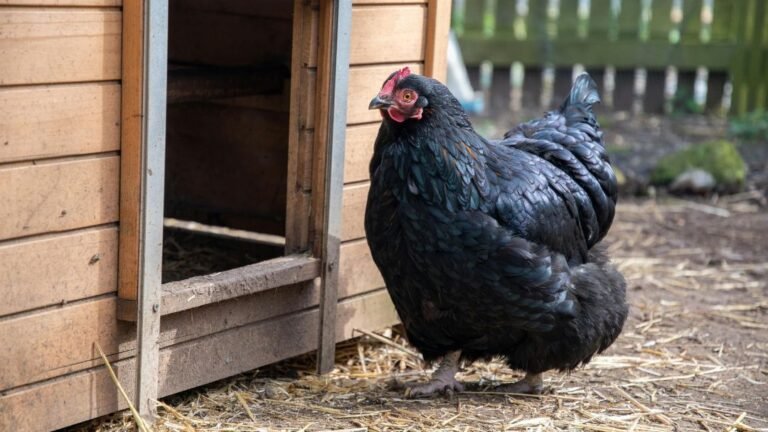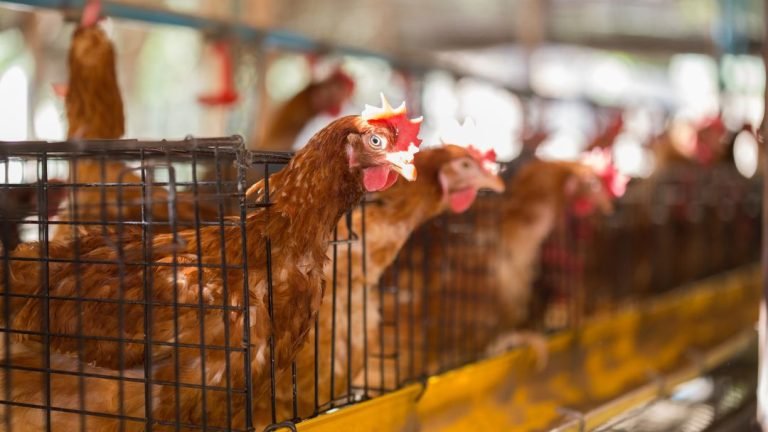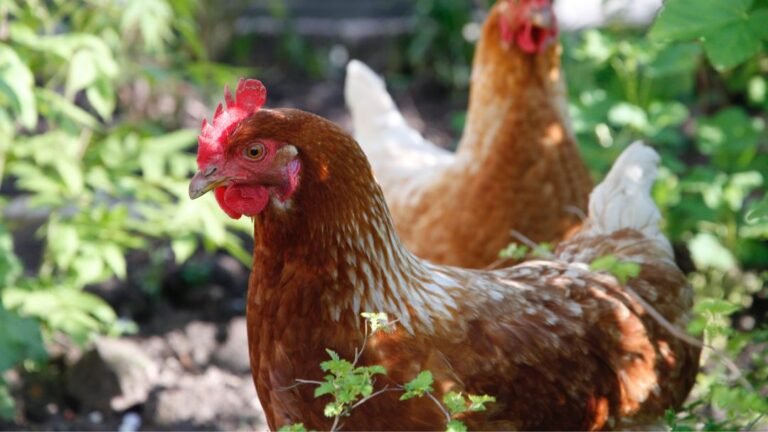Strong eggshells are crucial for chickens as they protect the developing chicks and provide essential nutrients. The calcium-rich shells promote healthy bone growth and prevent common health issues related to weak eggshells.
Additionally, strong eggshells ensure the eggs are less prone to breakage, allowing farmers to gain maximum yield and profitability. Chickens with inadequate calcium intake may produce eggs with thin shells, which are susceptible to damage and disease transmission. To maintain strong eggshells, a balanced diet with sufficient calcium and vitamin D is necessary for chickens.
Supplementing their feed with crushed oyster shells or ground limestone can ensure the hens have the necessary resources to produce sturdy eggshells. Farmers must prioritize the health of their chickens to ensure optimal egg production and the well-being of their flock.
The Importance Of Strong Eggshells
Chickens are fascinating creatures that rely on strong eggshells for a multitude of reasons. From their health and well-being to their ability to lay eggs, strong eggshells play a crucial role in their lives. Let’s explore why strong eggshells matter so much for chickens and the impact of weak eggshells on their overall health and productivity.
How Strong Eggshells Benefit Chickens
- Protection: Strong eggshells provide a protective barrier for the developing embryos inside. They shield the delicate contents from external forces, preventing any potential damage or harm.
- Calcium absorption: Chickens require a significant amount of calcium to maintain strong bones and produce eggs with sturdy shells. Strong eggshells indicate that chickens have proper mineral absorption, promoting their overall health.
- Reduced risk of infections: When eggshells are strong, they act as a defense mechanism against bacteria and pathogens. By preventing these harmful microorganisms from entering the egg, chickens can avoid various infections and diseases.
The Impact Of Weak Eggshells On Chickens’ Health And Well-Being
- Calcium deficiency: Weak eggshells are often a symptom of calcium deficiency in chickens. This can lead to a plethora of health issues, such as weakened bones, decreased egg production, and even impaired muscle function.
- Susceptibility to injury: Chickens with weak eggshells are more prone to injuries and fractures. Fragile shells make it easier for outside pressure to cause damage, leading to painful and debilitating fractures.
- Increased stress levels: Chickens with weak eggshells are more likely to experience stress and discomfort. The entire process of laying eggs becomes more challenging for them, resulting in increased stress levels and decreased overall well-being.
The Relationship Between Strong Eggshells And Egg Production
- Consistent egg production: Strong eggshells are directly linked to consistent egg production. When chickens have adequate calcium levels and robust eggshell quality, they are more likely to lay eggs regularly without interruptions.
- Enhanced fertility: Strong eggshells are an indicator of optimum fertility in chickens. They reflect the hen’s ability to produce healthy eggs that have a greater chance of successful fertilization and subsequent embryo development.
- Improved market value: Strong eggshells not only benefit the chickens themselves but also have a positive impact on the market value of the eggs. Eggs with sturdy shells are preferred by consumers due to their perceived freshness and higher quality.
Strong eggshells matter significantly for chickens, benefiting their health, well-being, and productivity. By understanding the importance of strong eggshells, chicken owners can ensure the optimum care and support for their feathered friends.

Factors Affecting Eggshell Strength
Not only are eggs a versatile and nutritious food source, but they also serve as an important source of income for livestock farmers. Ensuring strong eggshells is crucial for the health and well-being of chickens, as well as for their egg production.
Several factors play a role in determining the strength of eggshells, including nutrition and diet. In this section, we will explore the nutritional requirements for strong eggshells, the role of calcium in eggshell formation, and the impact of diet on eggshell quality.
Nutritional Requirements For Strong Eggshells
To support the development of strong eggshells, chickens require a well-balanced diet that meets their specific nutritional needs. A deficiency in any important nutrient can lead to weakened eggshells. Here are the key nutritional requirements for strong eggshells:
- Calcium: Adequate calcium intake is crucial for eggshell formation. Calcium is primarily obtained from feed sources, such as oyster shells, limestone, and calcium supplements.
- Vitamin D: Vitamin D aids in the absorption of calcium and plays a vital role in promoting strong eggshell development. Chickens can naturally synthesize vitamin D from sunlight, but it is also added to their diet through supplements or fortified feed.
- Protein: Protein is essential for the overall health of chickens and indirectly influences eggshell quality. It helps in the production and deposition of minerals necessary for eggshell formation.
- Trace minerals: Micronutrients like zinc, manganese, and copper are needed in small quantities but have a significant impact on eggshell strength. These minerals play a key role in various physiological processes, including shell formation.
Role Of Calcium In Eggshell Formation
Calcium is a critical mineral for chickens, especially when it comes to eggshell development. It not only aids in the formation of the eggshell but also supports muscular function and nerve transmission. Here’s how calcium contributes to eggshell formation:
- Shell gland: The shell gland is responsible for depositing calcium carbonate and other minerals onto the developing egg. Calcium is actively transported from the bloodstream to the shell gland where it combines with carbonate ions to form calcium carbonate crystals. These crystals then make up the eggshell.
- Remineralization: Throughout the egg’s journey from the developing ovum to the cloaca, calcium is continually absorbed and reabsorbed by the shell gland. This process, known as remineralization, ensures that the eggshell retains its strength and integrity.
The Impact Of Diet On Eggshell Quality
A chicken’s diet directly influences the quality of the eggs they produce, including the strength of the eggshells. Diets lacking essential nutrients can lead to thin or fragile shells. Here are some key points to consider regarding the impact of diet on eggshell quality:
- Calcium availability: Adequate levels of calcium must be present in the diet for chickens to produce strong eggshells. Feeding chickens with a well-balanced diet rich in calcium sources, such as oyster shells or limestone, is crucial.
- Vitamin D supplementation: Alongside calcium, vitamin D supplementation is necessary to ensure optimal calcium absorption. Without sufficient vitamin D, chickens may struggle to utilize the calcium present in their diet, leading to weaker eggshells.
- Balanced nutrition: A diet that meets all the nutritional requirements of chickens is essential for strong eggshell formation. This includes providing an appropriate balance of proteins, vitamins, and minerals to support overall health and eggshell development.
The nutritional composition of a chicken’s diet, especially the availability of calcium and other essential nutrients, greatly impacts the strength of eggshells. A well-balanced diet that meets these requirements ensures healthy and robust eggshell formation, enhancing both the welfare of chickens and the quality of eggs produced.
Essential Nutrients For Strong Eggshells
Chickens require a well-balanced diet to maintain optimal eggshell strength. Strong eggshells are vital for protecting the developing chick inside and preventing the eggs from breaking during incubation or handling. Let’s explore the essential nutrients that contribute to strong eggshells and discover feeding strategies to ensure chickens receive these nutrients in adequate amounts.
Calcium-Rich Foods For Chickens
To lay eggs with sturdy shells, chickens need a sufficient intake of calcium. Here are some calcium-rich foods to include in their diet:
- Crushed oyster shells: These shells boast high calcium content and can be offered as grit to chickens.
- Ground eggshells: A great way to recycle eggshells while providing chickens with an additional source of calcium.
- Leafy greens: Incorporate greens like kale, collard greens, and spinach into their diet. These greens not only provide calcium but also offer additional vitamins and minerals.
- Commercial feeds: Select chicken feeds that are specifically formulated to enhance calcium intake.
Other Nutrients Necessary For Optimal Eggshell Strength
Apart from calcium, there are other key nutrients required for chickens to produce strong eggshells. These include:
- Vitamin D: Enables calcium absorption and utilization in the body. Chickens can synthesize vitamin D from sunlight exposure, but additional sources like fortified feeds may be necessary.
- Phosphorus: Works in conjunction with calcium to strengthen eggshells. Choose feeds that contain an appropriate balance of calcium and phosphorus.
- Protein: Essential for overall growth and development, including the production of healthy eggshells. Feed chickens with high-quality protein sources such as soybean meal, fish meal, or insect-based feeds.
- Trace minerals: Minerals like manganese, zinc, and copper play a role in optimal shell formation. Ensure chickens have access to a balanced diet that includes these vital trace minerals.
Feeding Strategies To Ensure Optimal Nutrient Intake
To promote proper nutrient intake and strong eggshell development, consider implementing the following feeding strategies:
- Free-choice feeding: Allow chickens to have constant access to calcium-rich foods like crushed oyster shells for them to self-regulate their intake according to their needs.
- Supplemental lighting: In regions with limited sunlight, provide artificial lighting to ensure chickens can synthesize vitamin D and enhance calcium absorption.
- Balanced diet: Ensure chickens have access to a well-balanced diet that includes a mix of commercial feeds, greens, and protein sources, providing a comprehensive array of essential nutrients.
- Regular monitoring: Keep an eye on eggshell quality and the overall health of the flock. Any decline in eggshell strength may indicate a need for dietary adjustments or additional supplementation.
Remember, strong eggshells are vital for the well-being of both the hen and her chicks. By providing chickens with the necessary nutrients, you can ensure they lay eggs with robust shells, leading to healthier and more successful hatchings.
Environmental Factors And Eggshell Quality
Strong eggshells are crucial for the well-being of chickens. Environmental factors play a significant role in eggshell quality, highlighting the need to create a favorable environment for optimal chicken health and productivity.
Eggshell quality is a crucial aspect to consider when raising chickens. It not only determines the health and safety of the eggs but also affects the overall well-being of the flock. Environmental factors play a significant role in determining the strength of the eggshells.
In this section, we will explore the influence of temperature on eggshell formation, the role of humidity in eggshell strength, and how managing stressors can improve eggshell quality. So, let’s dive into it!
The Influence Of Temperature On Eggshell Formation
- Extreme temperatures can disrupt the calcium metabolism in chickens, leading to reduced eggshell quality.
- High temperatures can cause the birds to consume more water, resulting in decreased mineral uptake and weakened eggshells.
- Cold temperatures can also negatively impact eggshell quality due to the slower calcium absorption in the gut.
- Maintaining a moderate temperature within the chicken coop is crucial for optimal eggshell formation.
- Monitoring and regulating temperature levels can help ensure strong and durable eggshells.
- Providing suitable insulation and ventilation in the coop can help mitigate temperature-related issues.
The Role Of Humidity In Eggshell Strength
- Humidity levels influence the moisture content of the shells, affecting their overall strength.
- High humidity creates a moist environment, making it harder for the eggshells to dry properly, resulting in weaker shells.
- Low humidity can cause excessive evaporation, leading to dehydrated shells that are prone to cracking.
- Maintaining an optimal humidity level of around 50-70% in the coop is crucial for strong eggshell formation.
- Adequate ventilation can help regulate humidity by allowing excess moisture to escape while preventing excessive evaporation.
Managing Stressors To Improve Eggshell Quality
- Chickens can experience stress from various sources, such as overcrowding, sudden changes in the environment, or predator presence.
- Stress negatively influences the calcium metabolism of the birds, leading to reduced eggshell quality.
- Providing a suitable living environment with ample space, suitable nesting boxes, and access to fresh air and natural light can help reduce stress levels.
- Minimizing disruptions, such as loud noises or sudden movements, can also contribute to improved eggshell quality.
- A well-balanced diet rich in calcium and other essential nutrients can help strengthen the eggshells and fortify the overall health of the flock.
- Regular monitoring and proactive management of stressors can significantly improve the quality and strength of the eggshells.
Remember, ensuring strong eggshells is crucial for maintaining the health and productivity of your chicken flock. By understanding and managing the environmental factors that influence eggshell quality, you can provide your chickens with a conducive environment for optimal egg production.
Health Concerns Related To Weak Eggshells
Weak eggshells in chickens can lead to several health concerns, including calcium deficiency, egg breakages, and vulnerability to infection. Strong eggshells are important for maintaining the overall health and productivity of chickens.
Eggshells play a crucial role in the health and well-being of chickens. Strong eggshells provide protection for developing chicks and prevent the risk of bacterial infection. On the other hand, weak eggshells can lead to a host of health concerns for chickens.
In this section, we will explore the common health issues related to weak eggshells, preventive measures to promote strong eggshell formation, and veterinary interventions for chickens with persistent eggshell problems.
Common Health Issues Associated With Weak Eggshells
- Calcification problems: Weak and thin eggshells can be a result of inadequate calcium absorption in chickens. This can lead to calcification problems, where the eggshell lacks the necessary strength to withstand normal processes.
- Shell abnormalities: Weak eggshells can exhibit various abnormalities, including rough surfaces, cracks, or deformations. These irregularities can make the egg vulnerable to contaminants and can impact the overall health of the chicken.
- Egg breakage: Weak eggshells are more prone to breakage, resulting in loss of valuable nutrients and potential infections. It can also lead to reduced hatchability rates if eggs break prematurely during incubation.
Preventive Measures To Promote Strong Eggshell Formation
- Balanced diet: Providing chickens with a well-balanced diet that includes sufficient calcium is essential for strong eggshell formation. A diet rich in calcium sources such as oyster shells, limestone, or crushed eggshells can promote optimal eggshell production.
- Vitamin D supplementation: Vitamin D aids in the absorption and utilization of calcium in the chicken’s body. Ensuring adequate vitamin D levels through sunlight exposure or dietary supplements can support strong eggshell formation.
- Stress reduction: High stress levels can negatively impact eggshell quality. Implementing stress-reducing measures, such as maintaining comfortable living conditions and minimizing disturbances, can contribute to stronger eggshells.
- Hydration: Proper hydration is essential for overall health and eggshell formation. Providing fresh, clean water at all times encourages optimal hydration levels and supports strong eggshell development.
Veterinary Interventions For Chickens With Persistent Eggshell Problems
- Diagnostic testing: If a chicken consistently produces weak eggshells, veterinary intervention may be necessary. A veterinarian can perform diagnostic tests to identify any underlying health issues that might be impacting eggshell quality.
- Medications and treatments: In some cases, chickens may require medications or specific treatments to address underlying health conditions that affect eggshell formation. Veterinary guidance is crucial in determining the appropriate course of action.
- Nutritional adjustments: A veterinarian can recommend specific dietary adjustments or supplements based on the chicken’s individual needs. These interventions can help address any nutritional deficiencies impacting eggshell strength.
Weak eggshells can lead to various health concerns for chickens. Taking preventive measures, such as providing a balanced diet, ensuring proper hydration, and reducing stress, can promote strong eggshell formation. However, in cases where persistent eggshell problems arise, veterinary intervention becomes essential to diagnose and address underlying health issues.
By prioritizing the health of their chickens, owners can ensure a more robust and productive flock.
Best Practices For Maintaining Strong Eggshells
Maintaining strong eggshells is crucial for the health of chickens. The strength of the eggshell is essential for protecting the developing embryo, preventing contamination, and ensuring overall egg quality. By implementing best practices, such as providing calcium-rich diets and ensuring proper hydration, poultry farmers can ensure that their chickens lay eggs with strong and durable shells.
Why Strong Eggshells Matter For Chickens
Warding off potential health issues in your flock starts with ensuring they lay eggs with strong shells. Weak or thin shells not only pose a risk to the health of your chickens but can also affect the overall quality of the eggs they produce.
To ensure optimal eggshell strength, it’s important to implement the best practices outlined below. By making the necessary adjustments to your nesting and housing conditions, incorporating effective cleaning and sanitizing practices, and regularly monitoring your chickens, you can promote strong eggshell production and maintain a healthy flock.
Proper Nesting And Housing Conditions
Creating suitable nesting and housing conditions for your chickens is essential in supporting the development of strong eggshells. Here are some guidelines to follow:
- Provide a sufficient number of nesting boxes to minimize competition among hens and encourage them to lay in a clean, protected environment.
- Ensure nesting boxes are lined with a soft material, such as straw or shavings, to offer comfort to the hens and reduce the risk of cracked shells.
- Regularly inspect the nesting boxes for signs of damage, wear, or debris buildup, and address any issues promptly.
- Install adequate ventilation in the coop to maintain proper airflow and prevent excessive humidity, which can impact shell quality.
- Optimize lighting conditions in the coop to mimic natural daylight patterns, as this influences hormone production and eggshell formation.
Cleaning And Sanitizing Practices
Maintaining a clean and hygienic environment is crucial for strong eggshell production. Follow these cleaning and sanitizing practices:
- Regularly remove soiled bedding and replace it with fresh, clean material to prevent bacterial growth and potential shell contamination.
- Clean the nesting boxes at least once a week, removing any soiled nesting material and sanitizing the surfaces using poultry-safe disinfectants.
- Keep the coop and surrounding area free from feces, debris, and pests to minimize the risk of shell damage and bacterial contamination.
- Practice good personal hygiene by washing your hands thoroughly before and after handling eggs, minimizing the transfer of bacteria.
The Importance Of Regular Check-Ups And Monitoring
Regular check-ups and consistent monitoring are vital for maintaining strong eggshells and the overall well-being of your chickens. Here’s what you should do:
- Conduct routine health checks to identify any signs of illness or stress that may affect egg quality. Consult with a veterinarian if you notice any abnormalities.
- Monitor the feeding habits of your chickens, ensuring they receive a balanced diet that includes calcium-rich foods for adequate shell formation.
- Implement a feeding schedule to prevent overconsumption, which can lead to obesity and reduced shell quality.
- Keep a record of egg production, inspecting each egg for shell strength. Identify patterns or changes that could indicate a need for adjustments to their diet or environment.
By implementing these best practices for maintaining strong eggshells, you can support the overall health and productivity of your chickens. Remember to provide proper nesting and housing conditions, prioritize regular cleaning and sanitizing, and keep a close eye on the well-being of your flock.
A commitment to these practices will help ensure your chickens produce eggs with robust shells while promoting their long-term vitality.
Enhancing Eggshell Quality Through Breeding
Breeding plays a crucial role in strengthening eggshells for chickens, ensuring their overall health and productivity. Through selective breeding methods, genetic traits that contribute to strong shells are identified and amplified within poultry populations.
This section explores the techniques used to selectively breed stronger eggshells, the influence of genetics on eggshell quality, and the benefits and challenges associated with this breeding focus.
Selective Breeding Methods For Strong Eggshells
- Identification of shell quality traits: Breeders carefully evaluate various eggshell characteristics, such as thickness, hardness, color, and texture, to identify the most desirable traits for strengthening eggshells.
- Crossbreeding: By strategically pairing chickens with superior eggshell qualities, breeders can produce offspring with enhanced shell strength and integrity. This technique helps combine desirable traits from different breeds, resulting in improved overall eggshell quality.
- Parental selection: Breeders select parent stock based on their demonstrated ability to produce offspring with strong eggshells. This method ensures the inheritance of favorable genetic traits related to eggshell quality in subsequent generations.
- Progeny testing: To assess the effectiveness of their breeding programs, breeders conduct progeny testing. This involves evaluating the eggshells laid by offspring from selected parent stock to determine their quality and strength. These findings inform further breeding decisions.
The Role Of Genetics In Eggshell Quality
- Inheritance of traits: Eggshell quality is influenced by a combination of genetic and environmental factors. However, genetics play a significant role in determining the initial strength and characteristics of the eggshell. Specific genes control the deposition of mineralization in the shell, affecting its integrity and durability.
- Identifying genetic markers: Scientists and breeders collaborate to identify genetic markers associated with strong eggshell quality. These markers enable breeders to select breeding stock more efficiently and effectively, focusing on individuals with a higher likelihood of producing offspring with robust shells.
Benefits And Challenges Of Breeding For Stronger Eggshells
- Enhanced shell durability: Breeding for stronger eggshells ensures that hens produce eggs less prone to cracking or breaking during handling and transport. This reduces waste and increases the market value of the eggs.
- Improved hatchability: Strong eggshells have a direct impact on hatchability rates. Breeding for stronger shells increases the likelihood of successful embryo development, leading to healthier and more robust chicks.
- Nutrient retention: Eggs with strong shells are better at retaining their nutritional content. This is particularly important for farmers and consumers seeking eggs with high nutrient density.
- Maintaining genetic diversity: While selective breeding for strong eggshells offers numerous benefits, it is important to balance this focus with the preservation of genetic diversity within poultry populations. Overemphasis on a single trait may lead to a reduction in overall genetic resilience and susceptibility to diseases or environmental changes.
By ensuring the right breeding techniques and selecting favorable genetic traits, poultry breeders can enhance the quality of eggshells, benefiting both producers and consumers alike. With these efforts, chickens can lay eggs with stronger shells, improving their overall welfare and productivity.
Conclusion
Strong eggshells are of utmost importance for the overall health and well-being of chickens. Not only do they protect the delicate contents of the eggs, but they also serve as an indication of the birds’ nutritional status and overall health.
By providing chickens with a balanced diet that includes essential nutrients like calcium, phosphorus, and vitamin D, we can ensure the production of strong and durable eggshells. This, in turn, reduces the risk of cracked or broken eggs, prevents injuries to the hatching chicks, and minimizes potential health issues for both the birds and consumers.
The importance of strong eggshells cannot be overstated, as they are not only vital for the chickens’ reproductive process but also for the quality and safety of the eggs they produce. Therefore, it is crucial for poultry farmers and enthusiasts alike to prioritize the health and strength of their chickens’ eggshells through proper nutrition and care.



